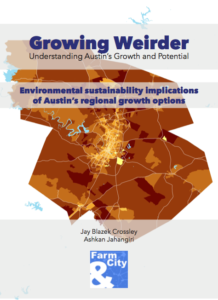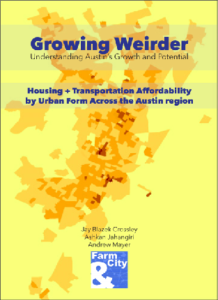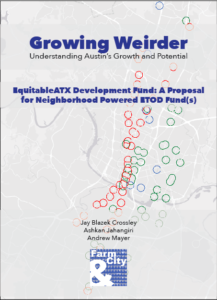At Farm&City, we champion land development reforms to create more affordable and sustainable urban living. Our work is highlighted by co-hosting YIMBYtown 2024 and our ongoing Growing Weirder project. These efforts have drawn bipartisan, nationwide attention to the need for innovative land use policies. We empower Texans with compelling narratives about regional growth, driving YIMBY (Yes In My Backyard) reforms at an impressive pace.
Our Approach
Our research demonstrates that urban areas in Austin, such as East Riverside, West Campus, and Rundberg, are the most affordable, low-carbon, and diverse parts of the city. Residents in these neighborhoods drive less, leading to lower per capita transportation-based carbon emissions. This finding underscores the importance of promoting urban density and reducing reliance on cars.
Policy Advocacy and Shifts
Our advocacy has led to significant policy shifts, including a focus on Equitable Transit-Oriented Development (ETOD) in Austin. We are working towards the creation of a Healthy Texas Communities Affordable Housing Fund, a state revolving ETOD fund with guaranteed levels of affordable housing units. This initiative aims to ensure that housing development is both equitable and sustainable.
Data-Driven Analysis
Leveraging our expertise in transportation policy, we utilize data, analytics, mapping, and research to advocate for safe, multimodal options and ending traffic deaths. This unique approach allows us to analyze the impacts of proposed housing policies on carbon emissions, vehicle miles traveled, affordability, water, land, and air quality.
Key Projects and Initiatives
- YIMBYtown 2024: Co-hosting this event to spotlight and advance land development reforms.
- Growing Weirder: A project aimed at empowering Austin residents with meaningful stories about regional growth.
- The Austin Parking Reform Coalition: Working to reform parking policies to support more efficient land use.
- TxLege 2025: Advocating for state-level land use and zoning reforms to create a more sustainable and affordable housing landscape.
- Equitable Transit-Oriented Development in Austin: Promoting ETOD to ensure that new housing developments are accessible and inclusive.
Community Engagement
We engage with city staff, elected officials, and the public to nurture broader discussions about land use reform. Our efforts include addressing specific NIMBY (Not In My Backyard) concerns, providing leaders with practical solutions, and framing the conversation in media and public forums. By consistently showing up at City Hall and other venues, we ensure that our vision for a more affordable and sustainable Austin is heard and acted upon.
Future Opportunities
- Healthy Texas Communities Affordable Housing Fund: Establishing a revolving fund to support ETOD projects with guaranteed affordable housing units.
- Statewide Land Use and Zoning Reform: Continuing to advocate for policies that promote housing abundance across Texas.
Farm&City Successes
Farm&City has been at the forefront of significant projects, events, and policy changes in Texas. Our efforts span across various domains, including transportation safety, urban planning, and sustainability. Below is a list of our accomplishments, showcasing our dedication and impact over the years.
Check out our Growing Weirder reports below. We combined analytical frameworks, grassroots and treetops advocacy, and public agenda framing necessary for a paradigm shift in the growth and development strategies of a complex, diverse 21st Century Austin.
The Reports

Building outwards instead of upwards is an environmentally disastrous choice. Austin residents of denser areas are responsible for drastically less impervious surface per capita, the financial and environmental footprint of municipal infrastructure is more efficient for compact, connected development, and the redevelopment of wasteful land use within the city means the preservation of hundreds of square miles of Texas pastures, forest, and countryside.
Read the Report
Download the pdf directly
 The affordability of a location is normally calculated with only housing costs. However, transportation is the second largest household expense. Throughout Texas, housing and transportation cost around half of typical local incomes. We divided Austin into urban, sub-urban, and rural areas based on population density and compared costs of housing and transportation in these areas as a percentage of typical median income. Bucking conventional wisdom, we found that urban areas of Austin are the most affordable.
The affordability of a location is normally calculated with only housing costs. However, transportation is the second largest household expense. Throughout Texas, housing and transportation cost around half of typical local incomes. We divided Austin into urban, sub-urban, and rural areas based on population density and compared costs of housing and transportation in these areas as a percentage of typical median income. Bucking conventional wisdom, we found that urban areas of Austin are the most affordable.
Read the Report
Download the pdf directly
Austin is in need of a multiplicity of strategies to address growing affordability and environmental crises. If we fail to responsibly plan for growth, low income communities and people of color will be disproportionally burdened with costs to their quality of life. Building off of successful models throughout the nation, we propose the establishment of an Equitable Transit-Oriented Development Fund to take advantage of the opportunity to make meaningful progress towards an Equitable Austin.
Read the Report
Download the pdf directly
 Zoning limits how many people are allowed to live within city limits placing an artificial cap on housing units capacity. This limit denies hundreds of thousands of people access to affordable, low-carbon lifestyles. Read our mini-report to learn about the current state of affairs, what CodeNEXT can do to help, and our vision for housing capacity in Austin.
Zoning limits how many people are allowed to live within city limits placing an artificial cap on housing units capacity. This limit denies hundreds of thousands of people access to affordable, low-carbon lifestyles. Read our mini-report to learn about the current state of affairs, what CodeNEXT can do to help, and our vision for housing capacity in Austin.
Our small amount of funding for this project ran out, but we expect to be able to finish this final report soon.

